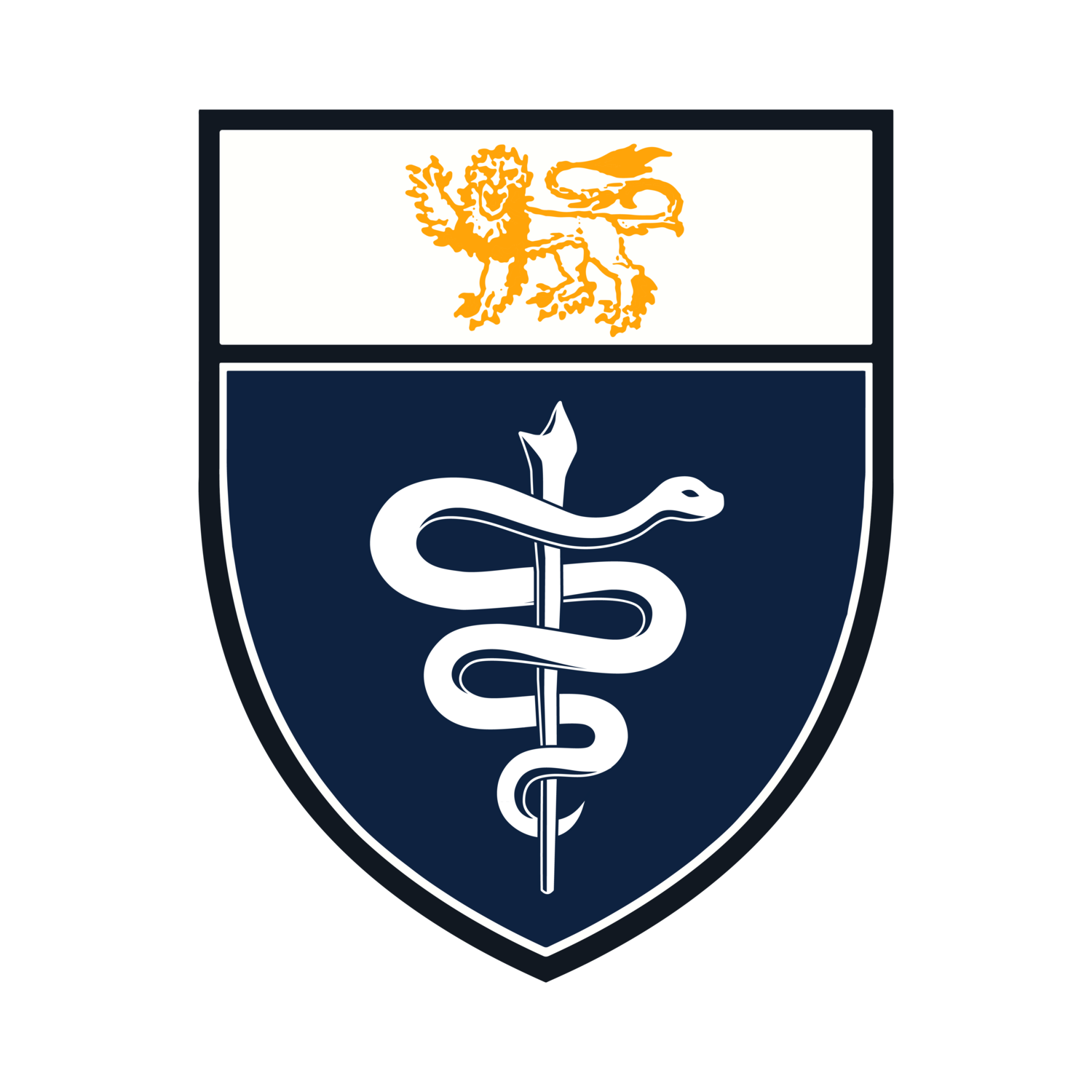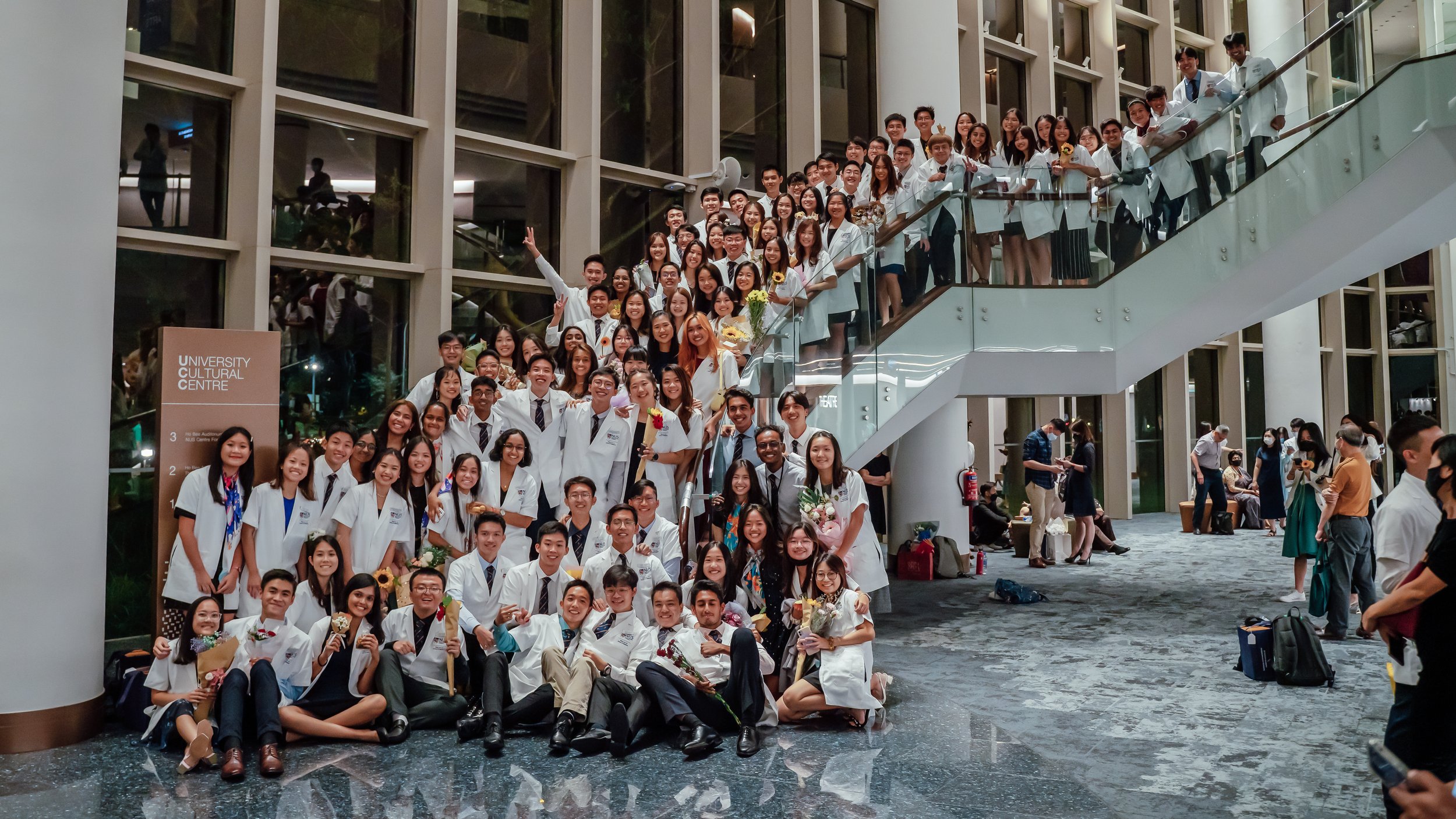This speech was originally delivered to the NUS Medicine Class of 2027 by the 73rd NUS Medical Society President, Ms Caitlin Alsandria O'Hara, on 12 August 2022, Friday, for the NUS Medicine White Coat [August] Ceremony 2022
A very good evening to our Guest of Honour, Dr Hakim Young, Dean: Professor Chong Yap Seng, Vice-Deans: Professor Lau Tang Ching and Marion Aw, distinguished guests and professors, Dean’s Office support staff and student volunteers, family members and loved ones, and to the class of 2027:
My sincere congratulations to you, for being presented your white coats today. My name is Caitlin and I am the 73rd president of the NUS Medical Society, which is the representative student organisation of NUS medical students. It is a great honor to be able to address you all today and I hope the next couple of minutes of this address doesn’t hold you back too long, and even better, leaves you with something valuable to take away.
Five years ago, I was seated somewhere at the back of this same auditorium, filled with equal parts excitement and anxiety. I was not sure what the next half-decade would have in store for me, and looking back, nothing could really prepare me for it. Similarly, nothing I say today can really prepare you for the range of highs and lows you will undoubtedly experience in your next few years here, as you navigate not only the challenging course that undergraduate medicine is, but also the many life transitions that come as a natural part of being in your early 20s. But today, I hope to share a thing or two from my own mishaps and small successes about how to make the most of your time within medical school, and hopefully, the years beyond it as well.
Allow me to share a story from a couple of weeks ago. I’m in my final year of medical school now, and as a final year student, I’m expected to be able to pick up key clinical signs in patients that I meet. For example, if someone’s liver is enlarged, I should be able to feel it when I press upwards on their tummy, or if someone has fluid in their lungs, I should be able to hear a sort of bubbly sound when I listen to their chest with my stethoscope.
So I was in a cardiology clinic, and a patient came in with a murmur, which is a ‘whoosh’ sound that can be heard in patients who have holes in their heart walls, or heart valves which are tight or leaky. Cardiology is one of my weak topics, so I had spent the night before studying quite late into the night for the next day. So I listened to the patient’s chest, repositioned my stethoscope, and listened again, but somehow no matter how hard I tried, I could not hear the murmur. After the patient stepped out of the room, and my attending doctor asked me what I thought I did wrong, I told him I really didn’t know and was sorry. Next thing I knew, I found myself starting to cry.
You might be wondering why I’d publicly declare something as embarrassing as this to a whole audience but trust be that there’s a point to this story!!
So there I was… sitting in the middle of a paediatric cardiology clinic, my attending doctor unsure of what exactly to do with this 24 year old sobbing medical student in front of him. I was ready for my attending doctor to talk to me about professionalism and learning to compartmentalise my emotions, and immediately apologized profusely for the fact that I had started crying in front of him. But rather than passing any such comments, what my attending doctor said instead took me by surprise. ‘Don’t be sorry,’ he told me, ‘the fact that you’re this emotionally affected by this shows me how much you actually care.’
So the point of this story is no, not (!!) to cry in front of your supervising doctors in medical school! The point of this story is that it’s okay to make mistakes as long as you learn from them (and I’m proud to say that I’ve been hearing all the murmurs since then!), and more importantly, that caring is not easy–in fact, it is more often than not painful–but caring is exactly what we must do.
I was fortunate to have a chance to speak to many of you on the first day of Medicamp in early July, telling you to ‘Join MedSoc!’. And I don’t mean to belabour the point–(though you should indeed join MedSoc)–but as my term as president of this organisation comes to an end soon, I thought to use some parts of my experience to share some takeaways.
A year ago when we were elected into office, our team decided that we wanted to focus on student wellbeing. And so we met with our school’s Office for Students (OfS), and went through meeting after meeting, a 58-page google document with an endless series of comments, an email thread with 45 emails, a complicated flowchart and 3 rounds of surveys. Eventually, a few weeks ago, our school’s Office for Students announced a pilot programme where after-hours counseling will be made available to healthcare students who have trouble attending office hours counseling due to our clinical schedules. This was a change that came not through the efforts of any single person, but out of a collective spirit of care. So my thanks goes out to Prof Marion, Dr Inthrani and Ms Siew Ling from OfS, and to my friends from MedSoc: Rebecca, Lincoln, Rubenesh, Ethan, Junie and Wei Xuan.
This little success of ours comes not without its fair share of difficulty. I know I sure felt a lot of doubt about whether our efforts would pay off. I didn’t think that we’d hit nearly two hundred survey responses, or that the counseling pilot would come through within our term. In fact, even the decision to run for president of MedSoc was something that I went back and forth on for weeks because I wasn’t sure if it would end up going well. We live in an environment that tells us that unless we succeed, then we’ve failed. And so sometimes, our desire for success paralyses us into inaction–but we must not let it stop us from trying.
I talk about MedSoc because we are an organisation that has always been for medical students, and by medical students. If we don’t show up to care for each other, who will? Looking beyond our immediate student community, which we most certainly must do, aren’t we all connected to one another? From people we meet on the daily, to those who are unduly marginalised by most of society–if we don’t show up to care for each other, then who is going to? While I’m stil a student, I’m so honoured to be affiliated to the medical community because it deeply values justice and non-discrimination in treating any patient who walks through its doors. Today marks your entry into this community too.
Caring is not easy. It is scary because whether our effort pays off is uncertain; it is painful because we will no doubt encounter failure in some form along the way; it entails sacrifice because there’s so much to do already in our every day. I was happy to hear that Dr Hakim was our guest of honour for this evening. It must not have been an easy process for him to leave for Afghanistan when he first did, let alone to work there for over a decade, but I’d like to think he did so because he simply cared.
And as we look and work outward to different communities, or different systemic or structural issues that we want to change, we must also remember to turn inward. I see great beauty in being a wounded healer, but we must remember to put on our own oxygen masks before we assist others with theirs. Take time always to look after yourself too, in whatever way that works for you.
So what do you care about? It can be a community you stand in solidarity with, it can be a principle or value you want to uphold, it can be the reason you applied to medical school in the first place, or the people close to you, or it can be a combination of all these things. Today, I’d urge you to consider writing down your answer to the question ‘What do I care about?’. Come back to it, maybe even reiterate every so often, and try your best to spend your life in ways that align to it.
Medical school will consume a great deal of your time and self. The human body is complex, and the diseases that afflict it even more so–perhaps this is the reason that some of you were drawn to medicine in the first place too. With this complexity comes the need to put in a great amount of time into our training, in order to do right by our future patients. Soon, it will become far more tempting to care less about things around you, but I urge you to try your hardest not to give in to that. No matter how disempowering or tiring things get, never let it stop you from caring about what matters to you.
That’s all I have to share today. Thank you very much for your time, and I wish you a fruitful journey ahead in medical school.
This is the third NUS Medicine White Coat Ceremony held in 2022, following the restrictions of the Covid-19 Pandemic.
Read the speeches delivered by the 73rd NUS Medical Society Vice-President, Ms Tay Wei Xuan, on 12 March 2022, Saturday, to the Class of 2025, as well as the 73rd NUS Medical Society President, Ms Caitlin Alsandria O'Hara, on 13 March 2022, Sunday, to the Class of 2026



